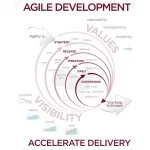Leadership Tip 14: Reduce Other People’s Dependence on Your Decisions
You’re a leader in the organization. And you’re supposed to be at another meeting, that started 15 minutes ago.
Your previous meeting ran long, so now you’re late. But the conversation you just had? That conversation prevented a bad product decision. (Or, it prevented a customer meltdown. Or something equally important.)
At least, the decisions you made earlier seemed quite important then.
Now, whatever the reason: you’re late.
And because of your role, you’re in the middle of many decisions. Your role demands that you shepherd many decisions in the organization.
Other people are dependent on your decisions. And you need to go to those meetings to pass judgment on their decisions, prevent people from making mistakes, and in general guide everyone’s work.
Don’t you?
When you do, you create an environment where other people depend on your decisions. You might be an enterprise architect, a middle or senior manager, a C-level executive. Or some other title.
When other people depend on your decisions, you remove their autonomy, mastery, and purpose. You make many things difficult:
- The ability of the people close to the work to learn to make good decisions.
- A succession plan for you, so you can move to another role at some point in the future.
- Overall faster decision-making, which allows for business agility. (The faster people can decide, the more they can experiment.)
Even worse, people learn not to make decisions because you’ll come in and save the day. In my experience, the best people leave. Why would they stay and not grow?
Let’s first discuss how things came to be this way.
Why Do You Make Decisions For Others?
When I work with leaders, I hear reasons like this:
- I was the original architect or product manager or developer, so I know the most about the system (or product).
- I’m the only one who can and does keep up with product context (or whatever context you have). No one else can make these decisions.
- It’s my job to make these long-lasting and important decisions. That’s what the company pays me for.
All of these reasons focus on the self and the context, as in the congruence picture at the top of this post. There’s nothing in there about the other, the other people in the organization. When we ignore other people, we are incongruent. See Insubordination vs Caring About the System.
As an organization grows, the original people retain much of their original power. They don’t relinquish their previous work—which prevents other people from learning. These experts place themselves in the middle of the work.
This is a form of micromanagement. See Leadership Tip #9: See & Stop Micromanagement—Learn to Trust Instead.
How might you learn to trust others and reduce their dependence on your decisions? Everyone needs to practice.
Practice to Reduce Other People’s Dependence on Your Decisions
If you have all the context, how can you share that context with others? You might:
- Conduct some kind of a learning session with a wide variety of people.
- Invite other people to the meetings you can’t say No to.
- Pair or work in a triad with people you’d like to promote to the next level of responsibility.
In addition, you might have to talk to your boss about what the company pays you for. Instead of paying you directly, your boss needs to pay you to nurture other people’s capabilities.
Then, re-examine your need to make all the decisions.
- How many decisions do you make for other people? How can you halve that number this week? Then halve again next week?
- How often do you need to change your decisions as you learn more information? Which of those decisions can you stop making now? Instead, can you offer guidelines and constraints so other people can make decisions?
- Map the value stream to see where your delays create problems for other people. See Why Minimize Management Decision Time.
Being late to a meeting is a signal.
Choose Your Meetings with Care
How often are you late for meetings? The more often you’re late, the more you have a signal that there’s a systemic problem. And the more all the various leaders go to meetings late, the bigger the problem.
Too many leaders decide for other people. The more leaders decide for others, the more they create dependence on the leaders’ decisions, and the slower the entire organization moves.
You don’t have to go to all these meetings. Reassess which meetings you need to attend and why. Then, get there on time.
This tip is mostly from Practical Ways to Manage Yourself, with a little from Practical Ways to Lead an Innovative Organization.
I’ll write in the next tip about what to do if your leader arrives late to your meeting.
This is a part of the series of leadership tips.
Published on Java Code Geeks with permission by Johanna Rothman , partner at our JCG program. See the original article here: Leadership Tip 14: Reduce Other People’s Dependence on Your Decisions Opinions expressed by Java Code Geeks contributors are their own. |



